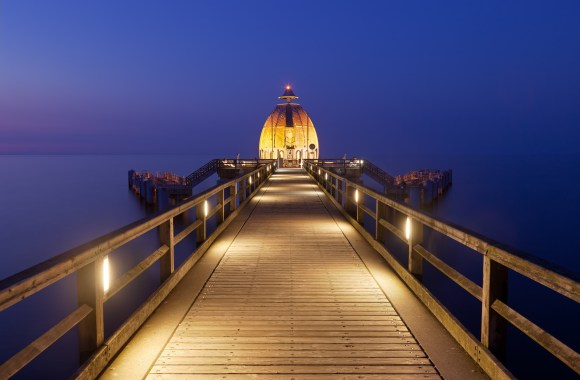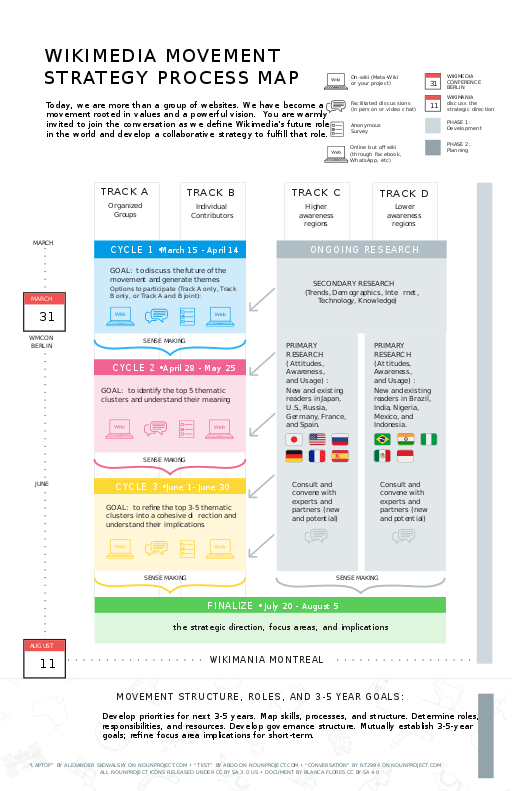
Wikipedia started as a simple idea: an online encyclopedia that was open for anyone to contribute, freely. And without any particular plan, we grew into a constellation of individuals, activities, and organizations. That simple idea—that everyone should be able to freely share in knowledge—proved to have a gravity of its own, pulling brilliant minds and institutions into its orbit. A remarkable movement built up around us.
Today, the Wikimedia projects are among the most beloved and popular websites in the world—and the largest collaborative knowledge resource in human history. Hundreds of millions of people visit the Wikimedia projects every month. Our global movement includes millions of volunteers who have edited over time, more than 100 affiliates, millions of donors, and thousands of partner institutions around the world.
We believe our mission is as important as it is ever been, because we believe free knowledge is more important than ever.
Today, the Wikimedia projects can take you almost anywhere—but where is the Wikimedia movement itself going? How will projects like Wikipedia change over the next 15 years? What do we want to achieve together? To answer those questions, the Wikimedia movement has launched Wikimedia 2030: a global discussion to define Wikimedia’s future role in the world. Our goal is to come together as a movement—contributors, affiliates, readers, donors, partners—around a direction that will guide our work over the next 15 years.
Everyone who values Wikipedia and the other Wikimedia projects is invited to participate. You can find more opportunities to join us at the end of this post.
Video by Victor Grigas, CC BY-SA 4.0. You can also view it on Vimeo or Youtube.
Wikimedia belongs to all of us. We all have a stake in the future of Wikimedia.
Wikimedia has experienced tremendous growth over the last 16 years. This growth has been possible because of an open model that allows anyone to participate. Because of this, Wikipedia belongs to everyone.
Much of the world has come to rely on free access to neutral, reliable information on Wikimedia projects. We as a movement have a responsibility to sustain and protect that access. We also have a responsibility to respond to the world as it changes, so people in every part of the world can benefit from free knowledge for generations to come.
Wikimedia projects are accessed by more than a billion devices every month, but we know we are serving a small portion of the world’s population. Our projects are available in hundreds of languages, but a majority of our content is concentrated in a small few. Millions of people have access to the Internet, but billions more have yet to come online. The web is better populated, but it is also more commercial. We have more sources of information, but fewer common truths.
These are challenges and opportunities, and our vision calls for us to engage them. We believe in a world in which every single human can share in the sum of all knowledge. Over the next 15 years, we want to get closer to that vision by coming together as a movement around a shared direction.
Charting the path of our movement
Movements work together, plan together, and align together around core values. So do we. Movements also affect significant social change. And for many people, that is what we do as well. We drive change towards greater openness, greater sharing, a richer commons, more knowledge available to more people. At their best, movements take advantage of their power and engage directly with their weaknesses.
#Wikimedia2030 is designed to be inclusive of many voices from every part of the globe, whether you are an editor, reader, affiliate, partner, or donor. The process will engage people across a variety of channels, including on-wiki discussions, in-person events, individual interviews, qualitative and quantitative research, and more. We hope that anyone who is interested can engage in their own way, and gain something from the process.
In this process we have five goals:
- Identify as a movement a cohesive direction that aligns and inspires us all on our path to 2030.
- Build trust, goodwill, and alignment within our movement. Participate in a legitimate, transparent, open process based on shared power, not hierarchy.
- Better understand the people and institutions that form our movement, those we are not yet reaching, and how their needs may change over the next 15 years.
- Build a shared understanding of what it means to be a movement, how others outside of us can take part, and what it will take to increase our movement’s impact. Unite around how to grow to achieve our vision.
- Build relationships to expand and enrich our movement and prospective partners.
Over this calendar year, we will be hosting conversations about our vision for the future. We will be conducting research on the current and potential future for free knowledge around the world. We will engage volunteer contributors, movement affiliates, readers, donors, institutions, and experts who have a stake in free knowledge. We will challenge our assumptions and learn from each other. Just like on Wikipedia, we will chart our path through open dialogue, fact-based information, and iteration.
By this year’s Wikimania, being held in Montreal in August 2017, our aim is to have consensus around a number of themes that will culminate in a strategic direction for our future. This will help frame a discussion on how we work together moving forward.
Engaging people in hundreds of languages and locations is a monumental undertaking.
Coming to consensus on a long-term strategic direction for a global movement that supports some of the world’s most beloved websites is no small feat. With that in mind, our movement has put time, resources, and energy into building a process that will work for our unique needs. We started to design the process behind Wikimedia 2030 in July, after the Wikimedia Foundation Board of Trustees tasked the organization’s leadership with developing a plan for facilitating a discussion on the future of Wikimedia.
We assembled a core strategy team to shepherd the overall process and keep all groups involved and engaged. This core team includes williamsworks, a strategy consulting firm with more than a decade of experience working with nonprofits, companies, and philanthropists around the world. It also includes Wikimedians, affiliate members, and Foundation staff, each with responsibility for different stakeholders. We conducted research on strategy processes from other movements, reviewed Wikimedia’s past strategy processes, and worked in consultation with members of the Wikimedia movement to design this process.
The process for shaping conversations was designed in collaboration with a Community Process Steering Committee composed of volunteers from 10 countries who have deep experience with Wikimedia. With the Steering Committee, we have designed a framework that includes voices from across the movement, over three phases of discussion: (1) discuss the future of the movement and generate themes, (2) identify the top 5 thematic clusters and understand their meaning, and (3) refine the top 3-5 thematic clusters into a cohesive direction and explore their implications.
To organize this movement-wide discussion, we are organizing our conversations across four “tracks” of information sharing and dialogue that meet the unique needs of those different audiences. The tracks include:
- Organized groups within our movement, including Wikimedia movement affiliates (chapters and user groups) and committees
- Individual contributors to the Wikimedia projects: writers, editors, photographers, developers, and more
- Current and future readers and institutional partners in higher awareness regions, like Australia, Canada, France, Germany, Japan, Russia, and the United States (for examples)
- Current and future readers and institutional partners in lower awareness regions, including countries like Nigeria, India, Egypt, Indonesia, Mexico, and Brazil
Chart by Blanca Flores, CC BY-SA 4.0.
Where we go from here
Our work on Wikimedia 2030 has begun. We started with conversations with volunteer editors and affiliate organizations. The first discussions are underway on Meta-Wiki and taking place at in-person meetups around the world. On dozens of project wikis, and in many offline conversations happening in the coming month, we are asking “What do we want to build or achieve together over the next 15 years?”
Community members from across the movement are engaging in the process already. To date, nearly 20 community coordinators are liaising with local volunteers in multilingual discussions around the world, and 85 affiliate organizations are actively engaged in community discussions. Many of these individuals and groups came together in late March at the Wikimedia Conference in Berlin for facilitated strategy conversations.
In the coming weeks and months, we will hold similar conversations with readers, donors, and partner organizations through events, research, and interviews. Our goal is to understand the key trends that matter to the many stakeholders of our movement, from emerging technology platforms to changing media consumption habits, and welcome people into the process. We will engage experts who have an eye on the future of global knowledge, education, technology, and community building. We will learn from readers around the world about their relationship with Wikimedia projects and what they’d like to see in the future. The information we learn will be incorporated back into community discussions and the overall synthesis process. As always, and in true Wikimedia spirit, we will share everything we learn in public.
We will publish regular updates and share ways to get involved.
How you can get involved
In the coming months we will be sharing many ways to get involved, from social media to online discussions. You have a say in Wikimedia’s future, and we want to hear it! Here are some ways to get involved right now:
Are you an individual contributor, for example an editor, developer, or researcher?
Are you part of an organized group actively engaged in Wikimedia, like a chapter, user group, or committee?
Do you read Wikipedia or use any of the other Wikimedia projects, like Wikimedia Commons, Wiktionary, Wikisource, or Wikivoyage?
- In the coming months, we will engage Wikimedia readers on our social media channels on Facebook and Twitter. We will ask questions about the future of Wikimedia and launch an essay contest to imagine what Wikimedia will be like in 2030.
- Learn more about our plans to engage readers and conduct research in higher awareness and lower awareness regions on-wiki.
Are you with an institution that is a Wikimedia partner or has a stake in the future of the Wikimedia movement?
- We are speaking with partner institutions through interviews and events over the coming months.
- If you are a partner institution and want to make sure we speak with you, email wikimediastrategy@wikimedia.org.
———
Thank you for helping us move towards a future in which every single human being can freely share in the sum of all knowledge.
I believe this is the start of many important conversations. I look forward to them and want to thank you in advance for taking part in them.
Katherine Maher, Executive Director
Wikimedia Foundation

Can you help us translate this article?
In order for this article to reach as many people as possible we would like your help. Can you translate this article to get the message out?
Start translation
